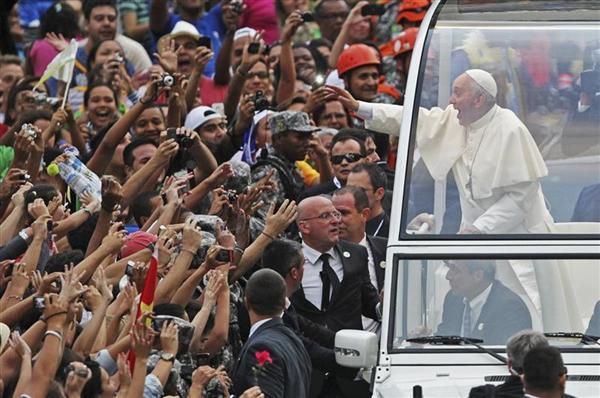|
Argentines second only to Poles in pope approval
Buenos Aires Herald
91 percent of citizens have a favourable opinion of Francis despite declining numbers of Catholics
Having dramatically changed the way that the Vatican reaches out to Catholics, followers of other religions and non-believers, and giving the Catholic Church a softer touch, Pope Francis enjoys broad global support with a median of 60 percent of people in 43 countries having a favourable image of the pontiff. Of the countries surveyed by the Pew Research Center, Poland took the spot for the country with the greatest sympathy for the Argentine pope with as much as 92 percent of the population indicating that they held him in high regard. Remarkably, only three percent of Poles held an unfavourable view, with the remaining group indicating that they had no impression of the pope. While not rejecting the pope on a majority basis, roughly 40 percent of those in the Middle East, Africa and Asia had no opinion. Broadly speaking, Francis has taken a far more pastoral approach to the papacy than his immediate predecessor Benedict XVI, while also bringing winds of change to the way that the Vatican is managed and promising no-tolerance for sexual abuse crimes committed by the clergy. That approach has won the pontiff support on a global scale and not just in Argentina. The only country with a population more in favour than Argentina is Poland. Approximately 88 percent of the Polish population is Catholic. It is also the birthplace of Pope John Paul II — himself a widely popular pope at a time of political transition at the end of the Cold War and in troubled times immediately before and after the collapse of the Soviet Union. John Paul II was the first and only Slavic pope to date, a feat matched by Francis as the first-ever Latin American pope. As such and perhaps unsurprisingly, 91 percent of Argentines have a favourable opinion of Pope Francis, although a recent Pew study suggested that the number of Argentines describing themselves as Catholics between 1970 and 2014 fell by 20 percentage points to 71 percent of the total population. However, even among Argentine non-Catholics the approval ratings remained high at 73 percent, suggesting a national affinity for the figure who reaches beyond purely theological grounds. The ratings among non-Catholics are higher than the global median approval ratings and in the general population for countries such as the United Kingdom, Venezuela and just shy of the 74 percent of Brazilians that approve of the pope. Brazil, once a Catholic stronghold, has seen a rapid increase in the number of evangelical protestants at the expense of Catholic believers. And despite the decline in Catholic beliefs in Argentina, the pope has received a “very favourable” rating by no less than 65 percent of the entire population. Pope Francis is of course none other than Jorge Bergoglio, former Archbishop of Buenos Aires from 1998 until 2013 and president of the Argentine Episcopal Conference from 2005-2011. As archbishop and pope, Bergoglio has been a political figure, with trips to the Vatican by politicians, unions leaders, human rights leaders as well as figures from the business and entertainment worlds becoming commonplace. In the region and around the globe The last 34 years have not been kind to the Catholic Church in Latin America, which is home to about 425 million Catholics and 40 percent of the global Catholic population, as there has been a general trend across the region toward reduced identification with the Church. As such, the differences in approval ratings for the pope between Catholics and non-Catholics in Latin America are quite wide. The gap is 63 percentage points in Mexico, the widest in the region, but similarly high differences can be found in the countries of Central America that have seen a growth in evangelical beliefs, which traditionally reject the figure of the pope. A similar phenomenon can be seen in the Philippines, which has a strong Catholic population but a growing evangelical movement. There, the gap is 43 percentage points and the approval ratings among the Catholic population is as high as 95 percent. According to the Pew Research Center, “in the US and Europe, the favourability gap is less substantial. Spain (-25), the US (-19), Poland (-17), Germany (-17) and France (-12) show smaller differences in support for the pope across the denominational divide.” In all of these countries approval ratings are high among believers and non-believers. However, majorities in all of the Latin Ameican countries still see the pope in a positive light, including seven-in-ten or more in Colombia (83%), Mexico (74%), Brazil (74%) and Peru (72%). Francis rates the most poorly in Guatemala, with only a 54 percent approval rating. Eight-in-ten or more Italy (91%), France (88%), Spain (84%) and Germany (82%) see the pontiff as a positive influence. Pew’s results were based on 1,512 in-person interviews carried out between November 2013 and January 2014 drawn form a sample that is nationally representative.
|
.
Any original material on these pages is copyright © BishopAccountability.org 2004. Reproduce freely with attribution.
